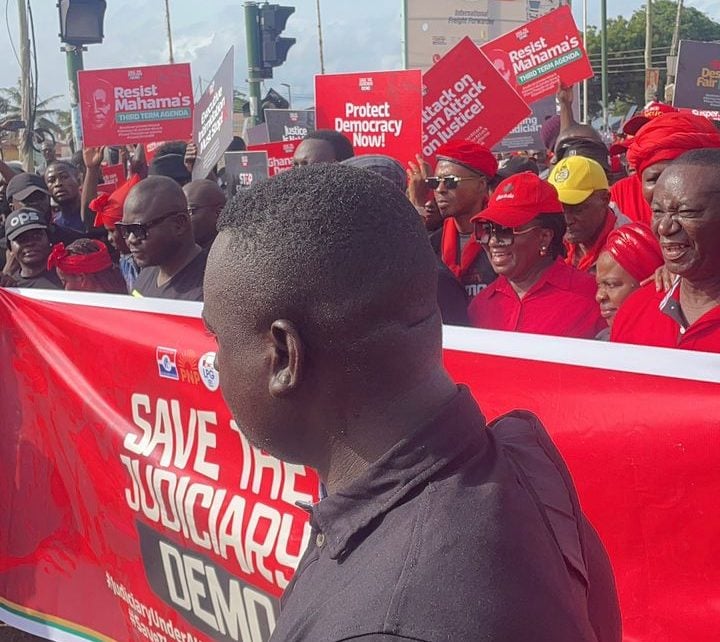The Genesis of Discontent: Seeds of Protest Sown in Ghana’s Political Landscape
The vibrant streets of Accra, Ghana’s capital, became the stage for a significant political demonstration on Monday, May 5th, 2024. A coalition of political parties, spearheaded by the New Patriotic Party (NPP), converged at the AMA car park, a stone’s throw from the Supreme Court, to voice their strong disapproval of what they perceived as a politically orchestrated assault on the independence of the judiciary. The catalyst for this demonstration was the contentious suspension of Chief Justice Gertrude Torkornoo, a move that ignited a firestorm of controversy and raised concerns about the delicate balance of power within the nation’s democratic framework.
The NPP and its allied parties viewed the suspension of Chief Justice Torkornoo as a blatant attempt to undermine the judiciary’s autonomy and bend it to the will of the ruling political forces. They argued that this action set a dangerous precedent, potentially jeopardizing the integrity of the judicial system and eroding public trust in the rule of law. This perception of an attack on judicial independence served as the rallying cry for the demonstration, drawing together a diverse array of individuals and groups united in their defense of democratic principles.
A Gathering Storm: Political Tensions Rise as Demonstration Takes Shape
As the demonstration gathered momentum, the atmosphere at the AMA car park crackled with an electric mix of anticipation and apprehension. The assembled crowd, a sea of faces reflecting a spectrum of emotions, held aloft banners and placards emblazoned with slogans denouncing the suspension of the Chief Justice and demanding her immediate reinstatement. The air reverberated with chants and speeches, amplifying the collective voice of dissent and underscoring the gravity of the situation.
The demonstration unfolded against a backdrop of heightened political tensions in Ghana. The suspension of Chief Justice Torkornoo had exacerbated existing divisions and fueled accusations of political maneuvering and power plays. The NPP and its allies accused the ruling party of orchestrating the suspension to consolidate its grip on power and silence dissenting voices. These allegations further inflamed the political climate, adding fuel to the fire of discontent that had been simmering beneath the surface.
A Call for Justice: Voices of Dissent Echo through the Streets of Accra
The demonstration became a focal point for expressing a range of concerns related to judicial independence and the overall state of democracy in Ghana. Speakers at the rally articulated their anxieties about the perceived erosion of democratic norms and the potential for abuse of power. They emphasized the crucial role of an independent judiciary in safeguarding the rights of citizens and upholding the principles of justice and fairness.
The demonstration also served as a platform for highlighting the broader implications of the Chief Justice’s suspension. Concerns were raised about the potential chilling effect on the judiciary, with judges potentially feeling pressured to toe the government line for fear of reprisal. This, in turn, could undermine the impartiality of the courts and erode public confidence in the justice system. The demonstrators stressed the need for a transparent and accountable process to address the allegations against the Chief Justice, ensuring that due process was followed and that justice was served without political interference.
Beyond the Demonstration: A Nation Grapples with Questions of Governance
The demonstration reverberated beyond the confines of the AMA car park, sparking a national conversation about the importance of judicial independence and the delicate balance of power within a democratic society. The event became a lightning rod for discussions about the role of the judiciary in upholding the rule of law and protecting the rights of citizens. The controversy surrounding the Chief Justice’s suspension underscored the vulnerability of democratic institutions to political manipulation and the need for constant vigilance to safeguard their integrity.
The demonstration also highlighted the broader challenges facing Ghana’s democracy. Issues such as political polarization, corruption, and the erosion of public trust in government institutions came to the forefront. The event served as a stark reminder of the fragility of democratic gains and the ongoing need for active participation and engagement from citizens to ensure a vibrant and resilient democracy.
A Crossroads for Ghana: Charting a Course towards Democratic Renewal
The demonstration at the AMA car park represented a critical juncture in Ghana’s political landscape. It brought to the surface deep-seated anxieties about the state of the nation’s democracy and the potential for political interference in the judicial process. The event served as a wake-up call for all stakeholders, emphasizing the need for a renewed commitment to democratic principles and the importance of upholding the independence of the judiciary.
The aftermath of the demonstration left a lingering question mark over the future of Ghana’s democracy. The nation stood at a crossroads, facing a choice between reaffirming its commitment to democratic values or allowing political expediency to erode the foundations of its governance. The path chosen in the coming days and weeks would shape the trajectory of the nation’s democratic journey and determine whether Ghana could live up to its promise as a beacon of democracy in Africa.














